The New Ventura Water Rate Increase Will Effectively Cost You 43% More

“To sin by silence, when they should protest, makes cowards of men.”
—Ella Wheeler Wilcox
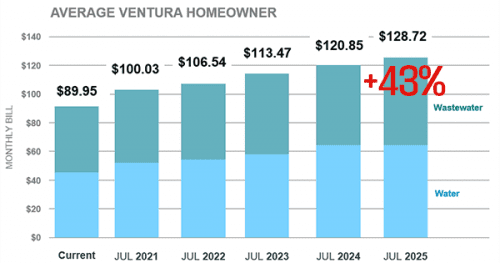
Decisions made by past and present City Councils led to Ventura Water increasing water rates by 7% and wastewater rates by 6% for each year over the next four years. Extrapolated out, the water rate increase for the “average” ratepayer will grow 43% during that time.
The current City Council and Ventura Water want to convince you we need the increases. They began the process by including a brochure in your latest water bill explaining why they propose increasing rates.
If You Don’t Protest, You Vote “Yes” Automatically
 Ventura is obliged under Proposition 218 to allow ratepayers to protest the rate increases. Yet, Ventura Water doesn’t make it easy to do so. The protest form is intentionally challenging to locate. In the 8-page Ventura Water ‘Proposed Rate Adjustments’ document, Ventura Water buries the protest procedure on the last page. It is not bolded or highlighted to stand out to the reader. The protest format is not user-friendly. There is little explanation on how to complete the form, making it confusing to property owners.
Ventura is obliged under Proposition 218 to allow ratepayers to protest the rate increases. Yet, Ventura Water doesn’t make it easy to do so. The protest form is intentionally challenging to locate. In the 8-page Ventura Water ‘Proposed Rate Adjustments’ document, Ventura Water buries the protest procedure on the last page. It is not bolded or highlighted to stand out to the reader. The protest format is not user-friendly. There is little explanation on how to complete the form, making it confusing to property owners.
VREG has written before about how unfair filing a protest under Prop 218 is in Ventura. While Ventura does what is minimally required to be legal, the way objections are structured limits public complaints and makes it nearly impossible for voters to overturn any rate increase. In no way does Ventura’s protest procedure truly measure the public’s intent to tax themselves further.
The notice explains that the city will hold public hearings on April 19, 2021 and April 28, 2021.
If you oppose this increase, Ventura Water’s notice states that the parcel owner, or customer of record on the water bill, must file a written protest with the City Clerk at City Hall.
Where To Get Your Rate Increase Protest Form
 The City did not enclose a protest form with the rate increase notice. Instead, the brochure directs you to go online. You can find the Water Shortage Rate Protest form here. You can complete the form online, but you must print it for it to count.
The City did not enclose a protest form with the rate increase notice. Instead, the brochure directs you to go online. You can find the Water Shortage Rate Protest form here. You can complete the form online, but you must print it for it to count.
Written protests may be submitted by mail to the Ventura City Clerk’s Office at 501 Poli Street (Room 204) Ventura, California 93001, or in person at the drop box near the back entrance of City Hall at 501 Poli Street, Ventura, California 93001 (parking lot behind City Hall). City Hall is currently closed to the public due to the novel coronavirus (COVID-19) pandemic. All mailed written protests must be received (not postmarked) by the City Clerk no later than May 17, 2021, at 5:00 pm.
To prevent the rate increase, most property owners (51%) must file a protest. Renters have no right to protest. Business owners have no right to protest. Only the 32,000 people that own property with water meters have a right to vote. The remaining 81,000 people in the City of Ventura are effectively disenfranchised. They have no vote but will have to pay.
Why Is Ventura Raising Rates?
Ventura Water Department justifies the rate increase by saying we must “control our water and wastewater,” and Ventura Water does not “trust” other agencies to help do that.
 Instead, Ventura Water plans to build a $240 million wastewater treatment plant that will duplicate facilities that already exist near Ventura. The 2019 Corollo Report (commissioned by Ventura Water), titled Ventura Water Supply Projects and Alternatives, states that if Ventura Water utilizes the United Water Conservation and the Oxnard Water Treatment Plant, they would not need to build a separate treatment plant. The cost savings to Ventura ratepayers could be enormous.
Instead, Ventura Water plans to build a $240 million wastewater treatment plant that will duplicate facilities that already exist near Ventura. The 2019 Corollo Report (commissioned by Ventura Water), titled Ventura Water Supply Projects and Alternatives, states that if Ventura Water utilizes the United Water Conservation and the Oxnard Water Treatment Plant, they would not need to build a separate treatment plant. The cost savings to Ventura ratepayers could be enormous.
Ventura Water neglects to mention that Ventura Water must rely on and co-exist with outside agencies like United Water and Casitas Water already. Also, soon Ventura Water will be working with the management of the State Water project to deliver water to the city.
The ‘lack of control and trust’ Ventura Water purports to be why it’s not cooperating with other water agencies is absurd. It’s already working with several other agencies and depends upon many other outside agencies for water resources.
The Unspoken Motivation Behind The New Plant
This City Council, and past ones, has accepted Ventura Water Department’s recommendations for a new processing plant called VenturaWaterPure without profound skepticism. Ventura Water has a massive conflict of interest (getting a new facility built and employing another 27 employees – Corollo Report 2019). Yet, the City Council seems oblivious. People may deny it, but governments measure their success in part by budget and staff size. Why would anyone think that the Ventura Water Department is any different?
Why Is The City Council Reluctant To Change?
The City Council fears that any redirection from building their facility will delay complying with the Wishtoyo Consent Agreement and result in substantial legal penalties. By extending the Consent Agreement deadline and utilizing the existing facilities at United and Oxnard, Ventura could produce a faster result.
Editors Comments On The Rate Increases
If we continue down this path, Ventura ratepayers will pay more than may be needed. Ventura Water has put the price tag on “control” and “trust.” It’s $200 million.
We’ve said repeatedly, at the very least, the Ventura City Council should:
- Call for an accurate, independent, cost analysis that could result in potential savings of $200 million
- Delay any rate increase to Wastewater rates
- Direct the City attorney to apply for a deadline extension on the Wishtoyo Consent Agreement to provide more time to find the optimal solution while avoiding substantial legal penalties
- Open negations with United Water and the City of Oxnard to utilize a wastewater treatment process.
Our current path is misguided and needs reevaluation. Whenever a financial decision boils down to “control,” the issue is power and prestige, not what’s best for the public.
Protest Your City Councilmembers’ Water Rate Increase
Below you’ll find the photos of our current City Council. Click on any Councilmember’s photo and you’ll open your email program ready to write directly to that Councilmember.
 |
 |
|
 |
 |
|
 |
 |
|
 |
For more information like this, subscribe to our newsletter, Res Publica. Click here to enter your name and email address.






 The most practical option available to the Council was to appoint a replacement. Four of the Councilmembers didn’t want to wait for a special election in November 2021. Nobody wanted to wait until November 2022 to fill the vacancy because of the concern about not having a seventh vote to break any tie vote.
The most practical option available to the Council was to appoint a replacement. Four of the Councilmembers didn’t want to wait for a special election in November 2021. Nobody wanted to wait until November 2022 to fill the vacancy because of the concern about not having a seventh vote to break any tie vote.
 The logistics of the procedure are grueling for both the applicants and the City Council. Interviewing all fifteen candidates in one sitting will be wearisome. It’s hard to imagine that the Councilmember’s attention will be as sharp at the end of the day as it was in the beginning.
The logistics of the procedure are grueling for both the applicants and the City Council. Interviewing all fifteen candidates in one sitting will be wearisome. It’s hard to imagine that the Councilmember’s attention will be as sharp at the end of the day as it was in the beginning.




 The Council made its November decision based on data presented on September 23, 2020, a month and a half earlier. The Council received no updated data on which to decide. If they had, the decision might have been different.
The Council made its November decision based on data presented on September 23, 2020, a month and a half earlier. The Council received no updated data on which to decide. If they had, the decision might have been different. estimates are optimistic. “We believe we’re conservative not to paint too bleak a picture,” Mr. Coon told the City Council on January 11, 2021. And, our City Council makes long-term decisions based on the short-term data they receive.
estimates are optimistic. “We believe we’re conservative not to paint too bleak a picture,” Mr. Coon told the City Council on January 11, 2021. And, our City Council makes long-term decisions based on the short-term data they receive. It seems clear that city staff provided fluid, optimistic data to the Council for their decision. Mr. Coon explained the projections, saying, “We are feeling alright with the additional projection of $1.5 million in Sales Tax for the current fiscal year. It is something that we definitely want to keep an eye on, especially if we start to see more businesses close.
It seems clear that city staff provided fluid, optimistic data to the Council for their decision. Mr. Coon explained the projections, saying, “We are feeling alright with the additional projection of $1.5 million in Sales Tax for the current fiscal year. It is something that we definitely want to keep an eye on, especially if we start to see more businesses close.



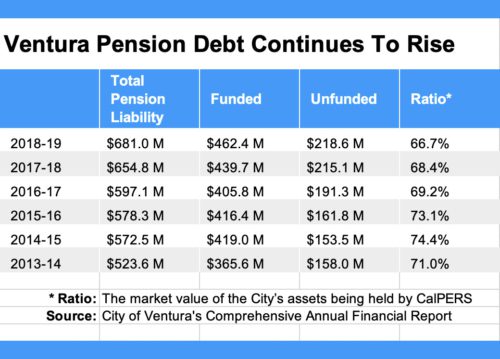
 For ten years, Ventura has done little to remedy its unfunded pension liabilities. During that time, there have been four different City Councils. Yet, they made only a modest effort to solve the problem. Then-Mayor Bill Fulton and City Manager Rick Cole claimed in 2011 that the City of Ventura had tilled new ground by requiring the city employees to pay something toward their retirement – 4 ½%.
For ten years, Ventura has done little to remedy its unfunded pension liabilities. During that time, there have been four different City Councils. Yet, they made only a modest effort to solve the problem. Then-Mayor Bill Fulton and City Manager Rick Cole claimed in 2011 that the City of Ventura had tilled new ground by requiring the city employees to pay something toward their retirement – 4 ½%. Make beneficiaries pay more. With the city covering 100 percent of the unfunded liability, the problem will continue to grow. There will be minimal reforms because the actuarial losses fall on the taxpayer. Capping the employer contribution at a fixed percentage of salary would cut pension costs for the city. As pension costs increase over the years, the employees will pay all the growing costs.
Make beneficiaries pay more. With the city covering 100 percent of the unfunded liability, the problem will continue to grow. There will be minimal reforms because the actuarial losses fall on the taxpayer. Capping the employer contribution at a fixed percentage of salary would cut pension costs for the city. As pension costs increase over the years, the employees will pay all the growing costs.

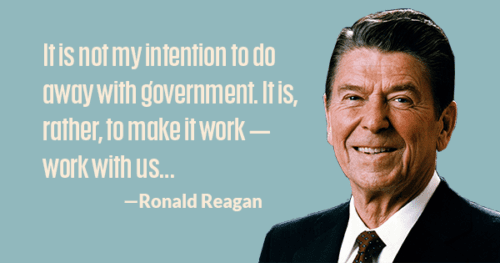
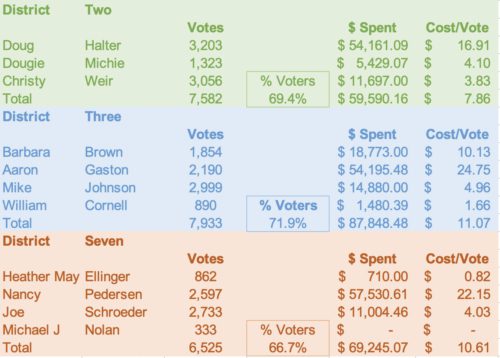
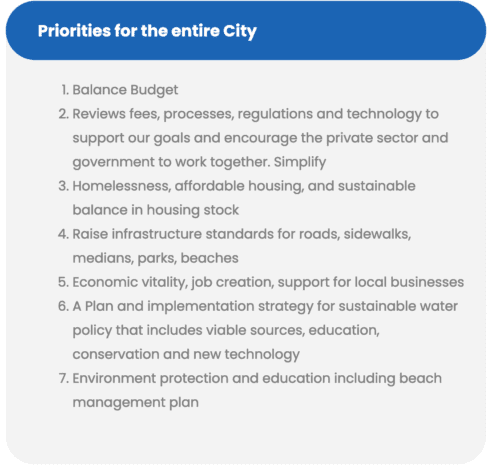
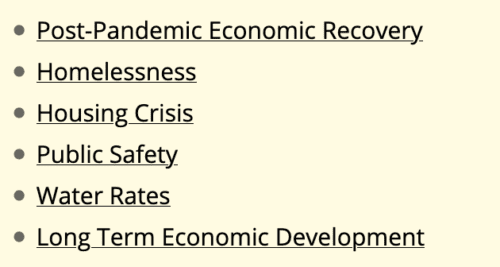
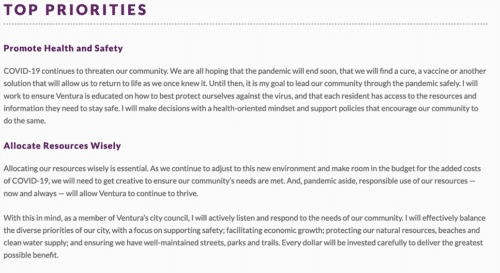
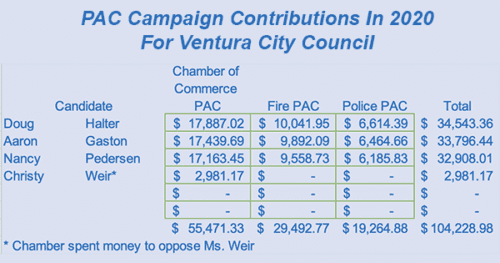







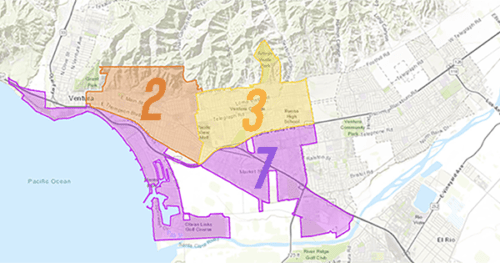
 District 2
District 2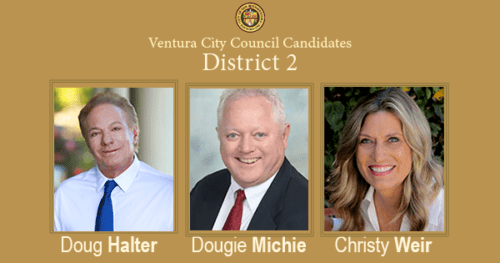


 Water will be among the costliest issues the City Council will face in the next four years. Ventura Water is asking the Council for over $300 million, making it as expensive to the city as public safety.
Water will be among the costliest issues the City Council will face in the next four years. Ventura Water is asking the Council for over $300 million, making it as expensive to the city as public safety.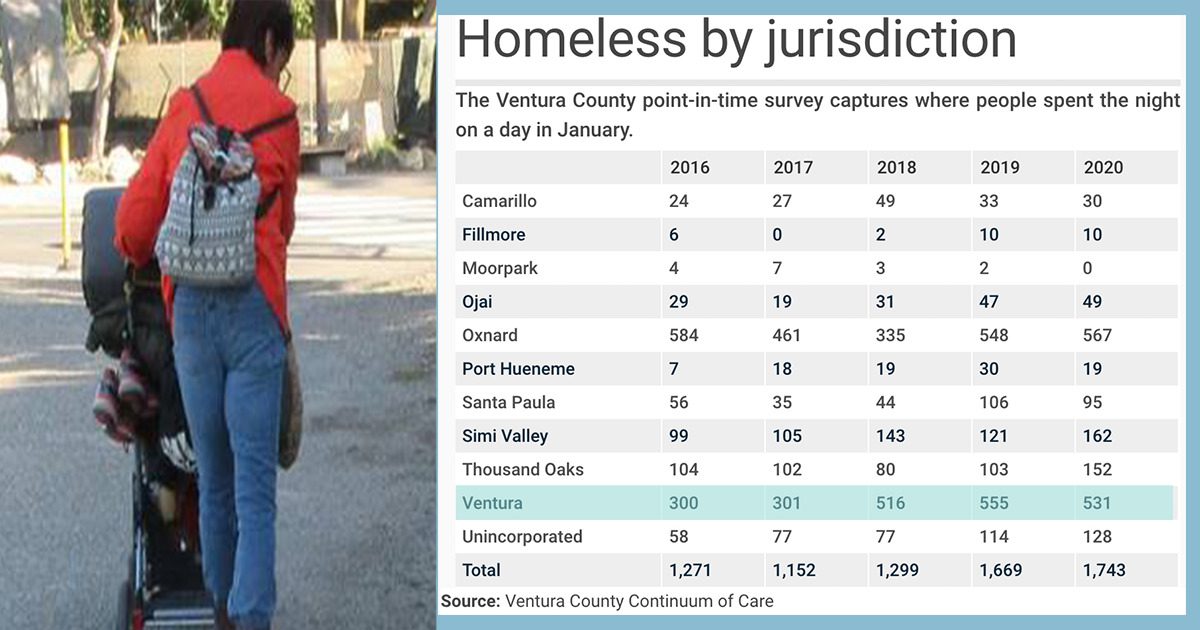






 Whether owned by a large corporation or a family, the initiative would be a massive tax increase. It will affect office buildings, retail stores, shopping malls, movie theaters, gas stations, supermarkets, factories, warehouses, self-storage facilities, auto dealerships, car washes, restaurants, hotels and every other job-creating business in the state. Even small businesses that lease space in a strip mall would see their operating costs jump sharply due to tax increases passed through from landlord to tenant.
Whether owned by a large corporation or a family, the initiative would be a massive tax increase. It will affect office buildings, retail stores, shopping malls, movie theaters, gas stations, supermarkets, factories, warehouses, self-storage facilities, auto dealerships, car washes, restaurants, hotels and every other job-creating business in the state. Even small businesses that lease space in a strip mall would see their operating costs jump sharply due to tax increases passed through from landlord to tenant.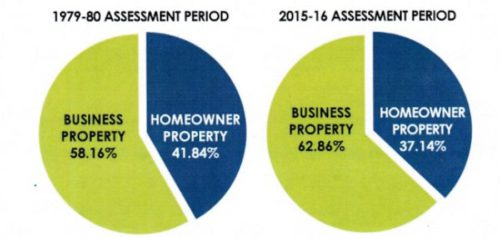
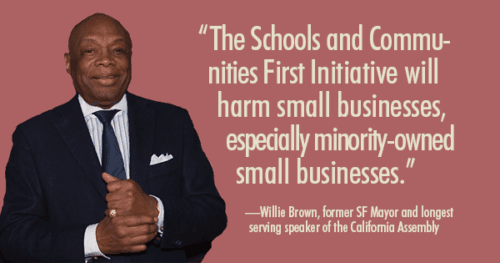 Willie Brown, former San Francisco mayor and the longest-serving Speaker of the California Assembly, also opposes this measure and stated: “…that the Schools and Communities First Initiative will harm small businesses, especially minority-owned small businesses.”
Willie Brown, former San Francisco mayor and the longest-serving Speaker of the California Assembly, also opposes this measure and stated: “…that the Schools and Communities First Initiative will harm small businesses, especially minority-owned small businesses.”


 Spreading $320 Million over ten years, divided equally among the 32,000 water ratepayers in Ventura, will cost about $83 more per month on your water bill. An extra 20-27 employees are required to operate the new facility, adding to the Ventura Water’s payroll, benefits and pensions. If Ventura Water adds the minimum number of new employees, using an average annual cost of $100,000 per person, plus benefits, will add $29.1 Million annually. Dividing $29.1 Million by 32,000 water ratepayers adds another $76 per month to each water bill.
Spreading $320 Million over ten years, divided equally among the 32,000 water ratepayers in Ventura, will cost about $83 more per month on your water bill. An extra 20-27 employees are required to operate the new facility, adding to the Ventura Water’s payroll, benefits and pensions. If Ventura Water adds the minimum number of new employees, using an average annual cost of $100,000 per person, plus benefits, will add $29.1 Million annually. Dividing $29.1 Million by 32,000 water ratepayers adds another $76 per month to each water bill. Ventura Water has already spent eight years to meet the demands of a Federal Consent Decree. Ventura must fully comply with the removal of remove tertiary treated wastewater from the Santa Clara Estuary by 2025. To achieve this mandate, VenturaWaterPure was set in motion to recycle its wastewater into something useful.
Ventura Water has already spent eight years to meet the demands of a Federal Consent Decree. Ventura must fully comply with the removal of remove tertiary treated wastewater from the Santa Clara Estuary by 2025. To achieve this mandate, VenturaWaterPure was set in motion to recycle its wastewater into something useful.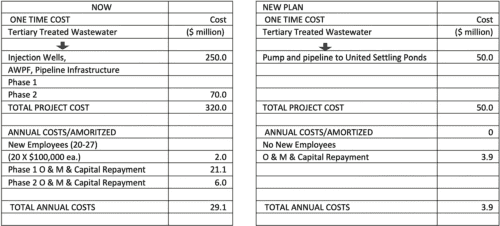
 Saving $270 million by redirecting the Santa Clara Estuary tertiary treated wastewater to the United Water Saticoy spreading grounds does not derail the other Ventura Water goals. With the continued construction of the State Water Project, State Water will provide an additional water resource to compliment the river, groundwater and recycling programs in place. The
Saving $270 million by redirecting the Santa Clara Estuary tertiary treated wastewater to the United Water Saticoy spreading grounds does not derail the other Ventura Water goals. With the continued construction of the State Water Project, State Water will provide an additional water resource to compliment the river, groundwater and recycling programs in place. The 


 Mr. McIntyre’s challenges are daunting. The local economy is in shambles. The city government and businesses will struggle to put people back to work safely and quickly. To survive the impending recession will require working closely with the city’s three unions, Fire, Police and Service Employees International Union (SEIU). And, he will have to guide an inexperienced City Council through budgeting during a recession.
Mr. McIntyre’s challenges are daunting. The local economy is in shambles. The city government and businesses will struggle to put people back to work safely and quickly. To survive the impending recession will require working closely with the city’s three unions, Fire, Police and Service Employees International Union (SEIU). And, he will have to guide an inexperienced City Council through budgeting during a recession. personnel-related. These include:
personnel-related. These include: Another Councilmember wants to
Another Councilmember wants to reviewing fee increases to discuss whether a fee should increase by 3% or $5. Such debate appears to be a poor use of City Council time.
reviewing fee increases to discuss whether a fee should increase by 3% or $5. Such debate appears to be a poor use of City Council time. A Safer Approach would be for the City Council and our City Manager to consider a combination of all 13 possible ‘budget-balancing tools.’ What’s more, they should consider deferring a few more pending projects. Take nothing on that list off the table.
A Safer Approach would be for the City Council and our City Manager to consider a combination of all 13 possible ‘budget-balancing tools.’ What’s more, they should consider deferring a few more pending projects. Take nothing on that list off the table.


 Sales taxes will be severely impacted by the COVID 19 pandemic, and
Sales taxes will be severely impacted by the COVID 19 pandemic, and  The most considerable expense for any city is payroll—including benefits and retirement. The salaries, benefits and pensions are all controlled by labor contracts. In fact, because of the COVID 19 pandemic, these costs will likely blow up. The Ventura City Council’s control of this expense is limited to reducing staffing levels. Here are examples that the City Council is considering.
The most considerable expense for any city is payroll—including benefits and retirement. The salaries, benefits and pensions are all controlled by labor contracts. In fact, because of the COVID 19 pandemic, these costs will likely blow up. The Ventura City Council’s control of this expense is limited to reducing staffing levels. Here are examples that the City Council is considering.  There are other costs the Council can influence. It’s time the City Council scrutinizes all the cost of services to consider less costly options. Those services can be General Fund items like fire and police, or they can be other operational items like water.
There are other costs the Council can influence. It’s time the City Council scrutinizes all the cost of services to consider less costly options. Those services can be General Fund items like fire and police, or they can be other operational items like water.